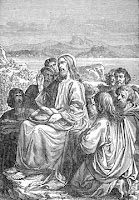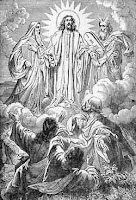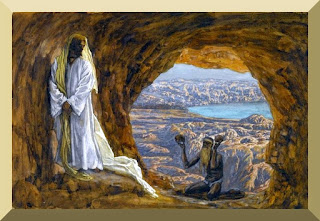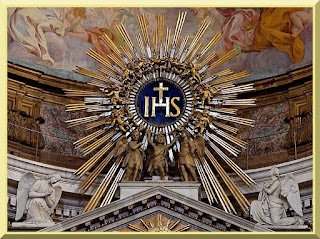(OCULI)
The
Introit of this day's Mass, which begins with the word Oculi, is the
prayer of a soul imploring deliverance from the snares of the devil:
INTROIT
My
eyes are ever towards the Lord: for he shall pluck my feet out of the
snare: look thou upon me, and have mercy on me, for I am alone and
poor. To thee, O Lord, have I lifted up my soul: in thee, O my God, I
put my trust: let me not be ashamed. (Psalms 24) Glory be to the
Father, etc.
COLLECT
We
beseech Thee, Almighty God, regard the desires of the humble, and
stretch forth the right hand of Thy majesty to be our defence.
Through Jesus Christ, our Lord, etc.
EPISTLE
(Ephesians 5:1-9.)
Brethren,
be ye followers of God, as most dear children; and walk in love, as
Christ also hath loved us, and hath delivered himself for us, an
oblation and a sacrifice to God, for an odor of sweetness. But
fornication, and all uncleanness, or covetousness, let it not so much
as be named among you, as becometh saints; nor obscenity, nor foolish
talking, nor scurrility, which is to no purpose; but rather giving of
thanks: for know ye this, and understand, that no fornicator, nor
unclean, nor covetous person, which is a serving of idols, hath any
inheritance in the kingdom of Christ and of God. Let no man deceive
you with vain words; for because of these things cometh the anger of
God upon the children of unbelief. Be ye not therefore partakers with
them. For you were heretofore darkness; but now light in the Lord.
Walk, then, as children of the light: for the fruit of the light is
in all goodness, and justice, and truth.
EXPLANATION
The
apostle requires us to imitate God, as good children imitate their
father in well-doing and in well-wishing; besides he declares that
all covetousness, fornication, all disgraceful talk and equivocal
jokes should be banished from Christian meetings, even that such
things should not be so much as mentioned among us; because these
vices unfailingly deprive us of heaven. He admonishes us not to let
ourselves be deceived by the seducing words of those who seek to make
these vices appear small, nothing more than pardonable human
weaknesses; those who speak thus are the children of darkness and of
the devil, they bring down the wrath of God upon themselves, and all
who assent to their words. A Christian, a child of light, that is, of
faith, should regard as a sin that which faith and conscience tell
him is such, and must live according to their precepts and not by
false judgment of the wicked. Should any one seek to lead you away,
ask yourself, my Christian soul, whether you would dare appear with
such a deed before the judgment-seat of God. Listen to the voice of
your conscience, and let it decide, whether that which you are
expected to do is good or bad, lawful or unlawful.
ASPIRATION
Place
Thy fear, O God, before my mouth, that I may utter no vain, careless,
much less improper and scandalous words, which may be the occasion of
sin to my neighbor. Strengthen me, that I may not be deceived by
flattering words, and become faithless to Thee.
GOSPEL
(Luke 11:14-28.)
At
that time, Jesus was casting out a devil, and the same was dumb. And
when he had cast out the devil, the dumb spoke, and the multitudes
were in admiration at it. But some of them said: He casteth out
devils by Beelzebub the prince of devils. And others tempting, asked
of him a sign from heaven. But he seeing their thoughts, said to
them: Every kingdom divided against itself shall be brought to
desolation, and house upon house shall fall. And if Satan also be
divided against himself, how shall his kingdom stand? because you
say, that through Beelzebub I cast out devils. Now if I cast out
devils by Beelzebub, by whom do your children cast them out?
Therefore they shall be your judges. But if I by the finger of God
cast out devils, doubtless the kingdom of God is come upon you. When
a strong man armed keepeth his court, those things which he
possesseth are in peace; but if a stronger than he come upon him, and
overcome him, he will take away all his armor wherein he trusted, and
will distribute his spoils. He that is not with me, is against me;
and he that gathereth not with me, scattereth. When the unclean
spirit is gone out of a man, he walketh through places without water,
seeking rest; and not finding, he saith, I will return into my house
whence I came out: and when he is come, he findeth it swept and
garnished. Then he goeth, and taketh with him seven other spirits
more wicked than himself, and entering in they dwell there. And the
last state of that man becomes worse than the first. And it came to
pass, as he spoke these things, a certain woman from the crowd,
lifting up her voice, said to him: Blessed is the womb that bore
thee, and the paps that gave thee suck. But he said: Yea rather
blessed are they who hear the word of God, and keep it.
Can
a man be really possessed of a devil?
It
is the doctrine of the Catholic Church that the evil spirit most
perniciously influences man in a twofold manner: by enticing his soul
to sin, and then influencing his body which he often entirely or
partially possesses, manifesting himself by madness, convulsions,
insanity, etc. Many texts of Scripture, and the writings of the
Fathers speak of this possession. St. Cyprian writes: "We can
expel the swarms of impure spirits, who for the ruin of the soul,
enter into the bodies of men, and we can compel them to acknowledge
their presence, by the force of powerful words." Possession
takes place by the permission of God either for trial or as a
punishment for sin committed, (1 Corinthians 5:5) and the Church from
her Head, Jesus, who expelled so many devils, has received the power
of casting them out as He did. (Mark 16:17; Acts 5:16, 8:6-7, 16:18,
etc.) She however warns her ministers, the priests, who by their
ordination have received the power to expel the evil spirits, to
distinguish carefully between possession and natural sickness, that
they may not be deceived, and the faithful should guard against
looking upon every unusual, unhealthy appearance as an influence of
Satan, and should give no ear to impostors, but in order not to be
deceived, should turn to an experienced physician or to their pastor.
What
is understood by a dumb devil?
The
literal meaning of this is the evil enemy, who some times so torments
those whom he possesses that they lose the power of speech; in a
spiritual sense, we may understand it to mean the shame which the
devil takes away from the sinner, when he commits the sin, but gives
back again, as false shame, before confession, so that the sinner
conceals the sin, and thereby falls deeper.
How
does Christ still cast out dumb devils?
By
His grace with which He inwardly enlightens the sinner, so that he
becomes keenly aware that the sins which he has concealed in
confession, will one day be known to the whole world, and thus
encourages him to overcome his false shame. - "Be not ashamed to
confess to one man," says St. Augustine, "that which you
were not ashamed to do with one, perhaps, with many." Consider
these words of the same saint: "Sincere confession subdues vice,
conquers the evil one, shuts the door of hell, and opens the gates of
paradise."
How
did Christ prove, that He did not cast out devils by Beelzebub?
By
showing that the kingdom of Satan could not stand, if one evil spirit
were cast out by another; that they thus reproached their own sons
who also cast out devils, and had not been accused of doing so by
power from Beelzebub; by His own life and works which were in direct
opposition to the devil, and by which the devil's works were
destroyed. - There is no better defence against calumny than an
innocent life, and those who are slandered, find no better
consolation than the thought of Christ who, notwithstanding His
sanctity and His miracles, was not secure against calumniation.
What
is meant by the finger of God?
The
power of God, by which Christ expelled the evil spirits, proved
himself God, and the promised Redeemer.
Who
is the strong man armed?
The
evil one is so called, because he still retains the power and
intellect of the angels, and, practiced by long experience, seeks in
different ways to injure man if God permits.
How
is the devil armed?
With
the evil desires of men, with the perishable riches, honors, and
pleasures of this world, with which he entices us to evil, deceives
us, and casts us into eternal fire.
Who
is the stronger one who took away the devil's armor?
Christ
the Lord who came into this world that He might destroy the works and
the kingdom of the devil, to expel the prince of darkness, (John
12:31) and to redeem us. from his power. "The devil," says
St. Anthony, "is like a dragon caught by the Lord with the
fishing-hook of the cross, tied with a halter like a beast of burden,
chained like a fugitive slave, and his lips pierced through with a
ring, so that he may not devour any of the faithful. Now he sighs,
like a miserable sparrow, caught by Christ and turned to derision,
and thrown under the feet of the Christians. He who flattered himself
that he would possess the whole orbit of the earth, behold, he has to
yield!"
Why
does Christ say: He who is not with me, is against me?
These
words were intended in the first place for the Pharisees who did not
acknowledge Christ as the Messiah, would not fight with Him against
Satan's power, but rather held the people back from reaching unity of
faith and love of Christ. Like the Pharisees, all heretical teachers
who, by their false doctrines, draw the faithful from communion with
Christ and His Church, are similar to the devil, the father of heresy
and lies. May all those, therefore, who think they can serve Christ
and the world at the same time, consider that between truth and
falsehood, between Christ and the world, there is no middle path;
that Christ requires decision, either with Him, or against Him ,
either eternal happiness with Him, or without Him, everlasting
misery.
Who
are understood by the dry places through which the evil spirit
wanders and finds no rest?
"The
dry places without water," says St. Gregory, "are the
hearts of the just, who by the force of penance have drained the
dampness of carnal desires." In such places the evil -one indeed
finds no rest, because there his malice finds no sympathy, and his
wicked will no satisfaction.
Why
does the evil spirit say: I will return into my house?
Because
he is only contented there where he is welcomed and received: those
who have purified their heart by confession, and driven Satan from
it, but labor not to amend, again lose the grace of the Sacraments by
sin, and thus void of virtue and grace, offer a beautiful and
pleasant dwelling to the devil.
Why
is it said: The last state becomes worse than the first?
Because
a relapse generally draws more sins with it, and so it is said: the
devil will return with seven other spirits more wicked than himself,
by which may be understood the seven deadly sins, because after a
relapse into sin conversion to God becomes more difficult, as a
repeated return of the same sickness makes it harder to regain
health; because by repetition sin easily becomes a habit and renders
conversion almost impossible; because repeated relapses are followed
by blindness of intellect, hardness of heart, and in the end eternal
damnation.
Why
did the woman lift up her voice?
This
was by the inspiration of the Holy Ghost to shame the Pharisees who,
blinded by pride, neither professed nor acknowledged the divinity of
Christ, whilst this humble woman not only confessed Jesus as God, but
praised her who carried Him, whom heaven and earth cannot contain.
Consider the great dignity of the Blessed Virgin, Mother of the Son
of God, and hear her praises from the holy Fathers. St. Cyril thus
salutes her: "Praise to thee, Blessed Mother of God: for thou
art virginity itself, the sceptre of the true faith!" and St.
Chrysostom: "Hail, O Mother, the throne, the glory, the heaven
of the Church!" St. Ephrem: "Hail, only hope of the
Fathers, herald of the apostles, glory of the martyrs, joy of the
saints, and crown of the virgins, because of thy vast glory, and
inaccessible light!"
Why
did Christ call those happy who hear the word of God and keep it?
Because,
as has been already said, it is not enough for salvation to hear the
word of God, but it must also be practiced. Because Mary, the tender
Mother of Jesus, did this most perfectly, Christ terms her more happy
in it, than in having conceived, borne, and nursed Him.
SUPPLICATION
O
Lord Jesus! true Light of the world, enlighten the eyes of my soul,
that I may never be induced by the evil one to conceal a sin, through
false shame, in the confessional, that on the day of general judgment
my sibs may not be published to the whole world. Strengthen me, O
Jesus, that I may resist the arms of the devil by a penitent life,
and especially by scorning the fear of man and worldly
considerations, and guard against lapsing into sin, that I may not be
lost, but through Thy merits maybe delivered from, all dangers and
obtain heaven.
– Goffine’s
Devout Instructions





